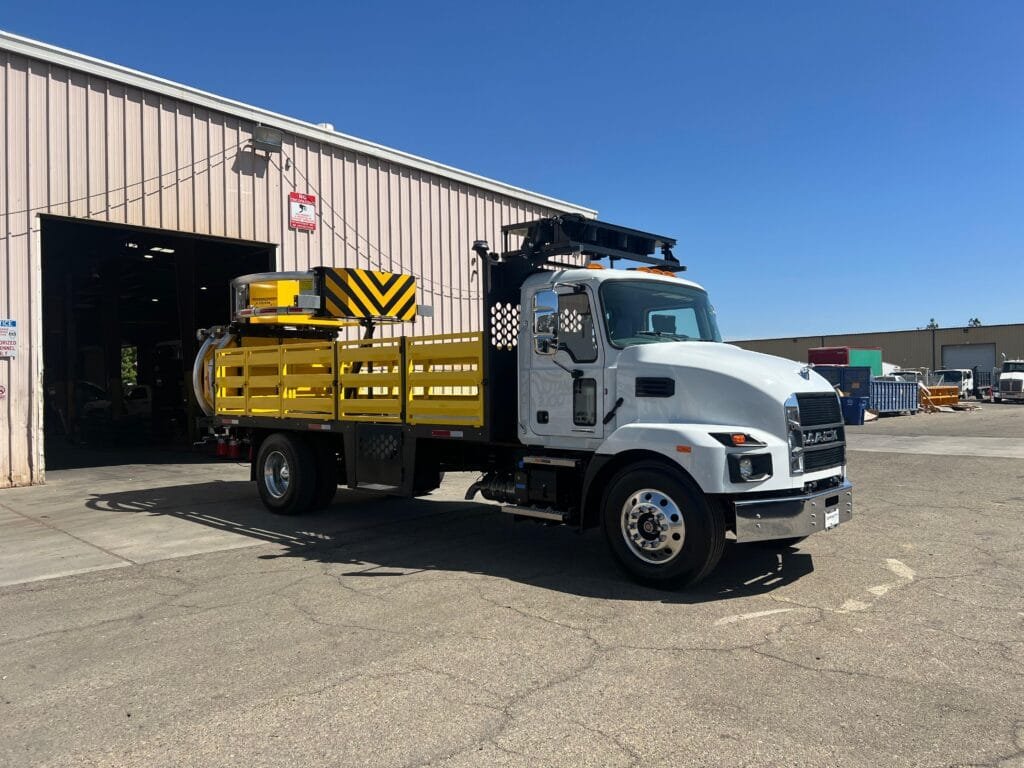Fleet downtime is one of the biggest challenges businesses face, especially those in industries where time is money, such as transportation, construction, and emergency services. Every minute a vehicle is out of commission costs your company not only in repair expenses but also in lost productivity and potential business opportunities. At Western Highways Traffic Safety, we understand how crucial fleet uptime is for your operations. In this article, we’ll explain why fleet downtime is so costly and how you can take proactive steps to minimize it.

1. The Real Cost of Fleet Downtime
Fleet downtime doesn’t just mean idle vehicles—it leads to lost revenue, delayed projects, and increased operational costs. Whether it’s a truck waiting for repairs, an unexpected breakdown, or a vehicle waiting for scheduled maintenance, every hour of downtime takes away from the efficiency of your business. Here’s a closer look at the real costs:
1.1. Lost Revenue
When your fleet isn’t in operation, you’re missing out on business opportunities. For companies reliant on their vehicles for service delivery, every moment a vehicle is down can directly impact customer satisfaction and revenue generation.
- Why It Matters: Delays in fulfilling contracts or providing services can damage customer relationships and even result in lost clients.
- How It Helps: Reducing downtime keeps your fleet operating, increasing your revenue potential and maintaining customer satisfaction.
1.2. Increased Repair and Maintenance Costs
Prolonged downtime often results from poor vehicle maintenance or deferred repairs. When vehicles are not properly maintained, it leads to more frequent breakdowns and more expensive repairs.
- Why It Matters: Major repairs are significantly more costly than regular maintenance. Additionally, parts that aren’t replaced when needed can cause further damage.
- How It Helps: By staying on top of regular maintenance, you can avoid costly repairs and extend the life of your fleet.
1.3. Wasted Labor Costs
When your vehicles are down, your staff may still be waiting to perform their duties. Whether it’s waiting for a truck to be repaired or being unable to fulfill a job, this results in idle labor hours, which directly adds to your costs.
- Why It Matters: Idle employees add unnecessary costs to the business without generating revenue.
- How It Helps: Ensuring your fleet runs efficiently means your workers can stay productive, keeping your business moving.
2. The Importance of Preventive Maintenance
Preventive maintenance is one of the most effective ways to avoid fleet downtime. By proactively servicing your vehicles, you catch small issues before they escalate into bigger, more expensive problems. Here’s why preventive maintenance is crucial:
2.1. Identifying Potential Issues Early
Routine inspections and maintenance allow technicians to identify and fix minor issues before they develop into major repairs. This reduces the risk of unexpected breakdowns and ensures that vehicles remain in optimal working condition.
- Why It Matters: Small issues that go unnoticed can lead to more serious damage, requiring extended downtime and costly repairs.
- How It Helps: Preventive maintenance reduces the likelihood of unexpected breakdowns, keeping your fleet on the road and operating efficiently.
2.2. Extending the Life of Your Fleet
Regular maintenance helps extend the lifespan of your vehicles by keeping them in peak condition. With proper care, your fleet can perform reliably for a longer period, allowing you to maximize the return on investment in each vehicle.
- Why It Matters: Vehicle replacements are a major investment, and getting the most out of your existing fleet can delay unnecessary purchases.
- How It Helps: Extending the life of your vehicles ensures long-term savings, deferring the cost of new vehicle acquisitions.
3. Implementing a Fleet Management System
Investing in a fleet management system is another effective way to minimize downtime. With the right system, you can monitor vehicle performance, schedule maintenance, track repairs, and even optimize routes for fuel efficiency and time management.
3.1. Real-Time Data and Monitoring
Fleet management systems provide real-time data on vehicle health, performance, and location. This allows you to identify issues as they arise and take immediate action, minimizing downtime.
- Why It Matters: Without real-time monitoring, you may not notice problems until they cause delays or breakdowns.
- How It Helps: Fleet management systems give you the ability to monitor performance and make data-driven decisions, helping prevent downtime and improve operational efficiency.
3.2. Scheduled Maintenance Reminders
Fleet management systems can automate maintenance schedules, ensuring that your vehicles are serviced regularly according to manufacturer recommendations. These reminders prevent maintenance tasks from being missed, which can lead to bigger issues later.
- Why It Matters: Missing regular maintenance can lead to unexpected breakdowns and prolonged downtime.
- How It Helps: Scheduling and following regular maintenance ensures that vehicles are always in top working condition, reducing the risk of future downtime.
4. Employee Training and Efficient Fleet Usage
Proper employee training is essential for reducing downtime and improving fleet performance. Drivers should be trained on how to operate vehicles efficiently, how to spot early signs of potential issues, and how to handle minor problems before they become serious.
4.1. Efficient Driving Habits
Encouraging your drivers to adopt fuel-efficient driving habits can reduce wear and tear on vehicles, leading to fewer breakdowns and reduced downtime.
- Why It Matters: Aggressive driving, such as sudden braking or rapid acceleration, can accelerate the wear on vehicle parts, leading to more frequent repairs.
- How It Helps: Efficient driving reduces the strain on your fleet, keeping vehicles on the road longer and reducing the frequency of maintenance.
4.2. Early Issue Identification
Training drivers to spot the early signs of issues, such as unusual noises or changes in performance, allows them to report problems before they lead to breakdowns. This helps you take action promptly and minimize downtime.
- Why It Matters: Early detection of problems can prevent serious damage that requires extended downtime and costly repairs.
- How It Helps: Employees who are knowledgeable about their vehicles can prevent issues from escalating, leading to fewer breakdowns and better fleet management.
5. How Western Highways Traffic Safety Can Help
At Western Highways Traffic Safety, we understand how vital fleet uptime is for your operations. Our team specializes in providing high-quality maintenance and fleet management services that minimize downtime and keep your vehicles running efficiently. Here’s how we can help:
- Preventive Maintenance: We offer regular maintenance services to keep your vehicles in top condition, ensuring that small issues are caught before they become expensive problems.
- Fleet Management Solutions: Our fleet management services help you monitor vehicle performance, schedule maintenance, and optimize fleet operations to reduce downtime.
- Expert Technicians: Our certified technicians are skilled in servicing all types of fleet vehicles, ensuring reliable and efficient service every time.
- Why It Matters: Choosing the right partner for fleet maintenance can significantly reduce downtime and improve operational efficiency.
- How It Helps: With Western Highways Traffic Safety, you can rely on expert service and comprehensive solutions to keep your fleet running smoothly and minimize costly downtime.
Conclusion
Fleet downtime can be costly and disruptive, but with the right strategies in place, you can minimize its impact and keep your vehicles on the road. By focusing on preventive maintenance, fleet management, and driver education, you can reduce repair costs, extend the life of your vehicles, and ensure that your fleet operates at peak performance. Contact Western Highways Traffic Safety today to learn how we can help you manage your fleet efficiently and avoid costly downtime.
Contact Us
For fleet management and maintenance solutions, contact Western Highways Traffic Safety:
- Phone: Call +1 (559) 785-1400
- Email: info@westernhighwaystrafficsafety.com
- Website: westernhighwaystrafficsafety.com




